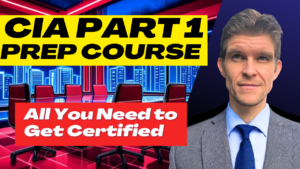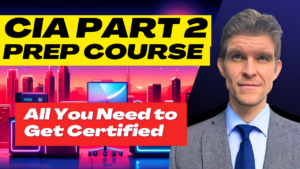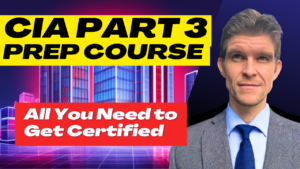As you start your journey to conquer CIA Part 2, it’s really important to dive deep into the exam material. The topics listed in the syllabus cover crucial subjects that match the real-world demands of internal auditing. To be ready for the challenges of the exam, you need to use effective study methods for each topic.
Get the Basics of CIA Part 2
CIA Exam Part 2 is named “Practice of Internal Auditing” and tests your knowledge of internal audit practices according to the Institute of Internal Auditors (IIA) standards. The syllabus for Part 2 outlines what you need to know.
Managing the Internal Audit Activity (20%)
Managing the internal audit activity is a careful process that involves overseeing everything from beginning to end. This section checks how well you work with people, follow standards, and stay in control of the whole audit process. Knowing how to manage people and the audit process is really important here.
Planning the Engagement (20%)
Planning the engagement is a key part of a successful audit. Good planning sets the stage for a successful audit by reducing risks and making the process more efficient. Dive into the details of engagement planning, like understanding risks, figuring out the scope, and allocating resources. If you understand how to plan engagements well, you’ll be off to a great start in this area.
Performing the Engagement (40%)
The most important part of internal auditing is performing the engagement, where you put what you’ve learned into practice. This part covers lots of tasks, like gathering information, analyzing it, evaluating it, and supervising. Being really good at these tasks is crucial for being a skilled internal auditor. Focus on understanding how to gather and analyze data and how to evaluate things to do well here.
Communicating Results and Checking Progress (20%)
After an audit, communicating results and checking progress are super important. Talking to the people who need to know and figuring out how to make things better need both good communication and following reporting rules. This part checks if you can talk about findings professionally and set up ways to check progress. Understand how to talk to people, report things, and check on progress to do well in this area.
Getting Ready for the Exam
With a good understanding of the topics, you need to get ready for the exam itself. Remember, CIA Part 2 has only multiple-choice questions (MCQs), and you’ve got 2 hours to answer 100 MCQs. That’s about 1.2 minutes per question. To be ready, you need to practice a lot to get comfortable with this.
Cognitive Levels and How Well You Know Stuff
Knowing the different levels of thinking needed for each topic helps you understand how much you need to know. There are two levels:
Basic Level: This is about remembering what you know and understanding the basics.
Proficient Level: This is about using what you know, analyzing things, and making decisions.
Understanding these levels shows you that you need to know things and use them too. Doing well in both levels is key to getting ready.
Passing, Study Time, and How Hard the Exam Is
CIA Part 2 is a tough one, just like the other parts. To pass, you need at least 600 points out of 750. Not many people pass – only 43%!
For studying, you’ll need around 30-40 hours for Part 2. It’s less than Part 3, but remember, the topics in Part 2 are harder.
Part 2 has more topics now, thanks to changes from the IIA. It’s harder now, testing you on both basic and more advanced levels. So, you need to be well-prepared.
How Hard Is CIA Part 2?
CIA Part 2 is like Part 1, but it’s about using what you know in internal auditing. Some things might be familiar if you’re an internal auditor, but Part 2 looks at the whole audit process closely. Just relying on your experience isn’t enough – you need to prepare really well.
Even if you find Part 2 questions a bit easier after doing Part 1, that doesn’t mean you should take it lightly. Both parts focus on different parts of internal auditing and have their own challenges.
The pass rates for the CIA exam show it’s tough, with only 43% passing overall. Even if you know some things, you still need good preparation. Part 2 needs 30-40 hours of study time, even if you’re familiar with some stuff.
Part 2 tests you on two levels of thinking: basic and more advanced. It checks if you can use what you know to solve problems. Being good at both levels is important.
Why Do People Fail CIA Part 2?
Failing Part 2 is often due to common reasons like other professional exams. Knowing these issues can help you prepare better.
Not Enough Time: Many people don’t study enough. Even if you know some things, you need a proper study plan.
Not Enough Effort: The CIA exam covers a lot. You need to study well and stay engaged.
Wrong Study Plan: Your study plan might not be right for you. Check how you study and your plan, and change if needed.
By knowing these problems, you can set up a strong plan to avoid them.
Passing CIA Part 2 in One Try
To do well in Part 2, you need a good plan. Follow these steps to boost your chances of passing on your first try:
Plan Your Study Time: Make a study plan that works with your schedule. Use study tools to help you.
Practice Like It’s Real: Get used to the exam setup with online practice. Study in a quiet place to make it like the real exam.
Do Lots of Practice: Doing many practice questions helps you know more and manage time better.
Don’t Just Memorize: Understand concepts instead of memorizing questions. The real questions might be different, so understanding helps.
Use Your Knowledge: If you’re not sure, use what you know to make smart guesses. Cross out wrong answers and think about real situations.
If you follow these steps, you’ll be ready for Part 2 and have a good chance of passing on your first try.
The Road Ahead
As you get ready for CIA Part 2, remember that success comes from hard work, understanding, and good study habits. The topics need a deep understanding of internal auditing, and knowing how to use it. By learning each topic, matching your study plan with thinking levels, and practicing a lot, you’ll be ready for the exam’s challenges.
In the next part of this guide, we’ll look at ways to get ready for the exam setup, manage time during the test, and solve problems. These things will help you perform well and feel confident about Part 2. Your journey to becoming a Certified Internal Auditor depends on your efforts, and success is possible.















